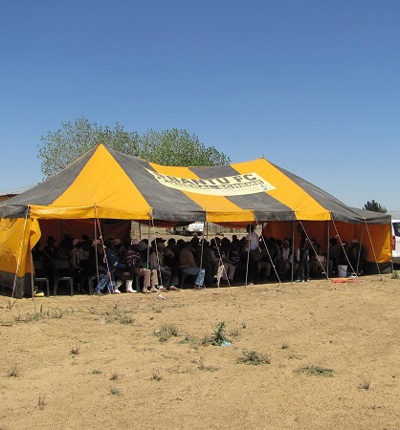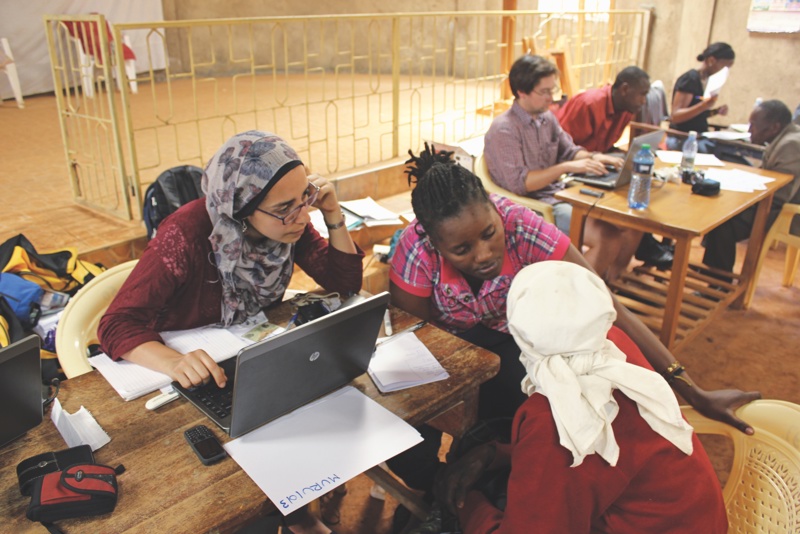
How we work
Working with our clients
Whether in person, by phone, or in writing, we communicate as regularly as possible with clients to provide advice and updates and to learn how they want us to pursue their cases.
Whenever possible, we meet our clients in person; we believe that meeting face-to-face is the best way to truly understand our clients’ needs. This can involve travelling for many hours, often to isolated and sometimes dangerous places.
Many of our clients speak languages other than English, and we routinely engage interpreters so that we can provide clear advice and take instructions. In addition, many of our lawyers speak more than one language.
As an English law firm regulated by an independent body, the Solicitors Regulation Authority, we must meet high standards of professional and ethical conduct in all our dealings with clients and the courts. When we act for international clients, we take the same client-centred approach to our work and apply the same high standards.
Advocacy and working with others
Our clients’ cases often have significant consequences for others in the community and people in other parts of the world. We regularly work alongside and build relationships with local, national, and international organisations to advocate for improved protection of human rights and the environment.
In many cases, local organisations and lawyers have been working to highlight the issues raised by our clients before we become involved. We believe that working collaboratively with such groups is mutually beneficial. For example, bringing a case in England often attracts significant media attention and can help raise public awareness of the human rights issues highlighted by local advocates. At the same time, a network of supportive organisations on the ground can help our clients resist intimidation by or for the companies they are suing.
A key objective of our work is to prevent future human rights violations. In addition to bringing cases to court, we pursue other strategies to strengthen the law to prevent human rights abuses from happening in the first place.
In particular, we advocate before national and international forums, such as the British Parliament and the United Nations, to promote access to justice and to secure greater legal protection of human rights.
 Leigh Day representatives meeting with claimants in Kenya
Leigh Day representatives meeting with claimants in Kenya
Gathering the evidence
What happened?
We often commit substantial resources to conducting factual investigations in-country, including obtaining documentary and witness evidence. In pursuing our clients’ cases, we frequently ask medical, scientific, environmental and other experts to conduct tests, prepare reports and give expert opinions to the court.
Who is responsible?
It is often difficult for those adversely affected by companies to know who is legally responsible for the harm they have suffered. The structure of large multinational corporations is generally complex. Typically, British-based companies have subsidiaries that carry out their activities in other countries.
To avoid responsibility for damage caused by subsidiary operations, such companies frequently rely on legal principles of “separate personality”—meaning that, in law, one company is a separate “person” that may not be responsible for the actions of another.
Over the past 30 years, Leigh Day’s cases have developed the law in England and established the principle that parent companies can owe a direct “duty of care” to those affected by the harmful activities of their overseas operations.
If the British company exercised control and direction over its subsidiary, we could gather evidence to persuade a court that the parent company in Britain is also legally responsible. Our approach has gained increasing recognition at an international level.
Access to information
Many companies restrict the information available about their organisation and operations. Similarly, the British Government has often withheld important documentation regarding its activities in different countries.
Companies and the Government often deploy strategies to prevent the disclosure of relevant information. However, Leigh Day’s specialists have developed effective ways of countering these strategies.
Our experts have the skills and experience needed to obtain and analyse complex company data and large amounts of documentation in various languages to successfully bring claims on behalf of our clients.
We also use procedures in the British courts to compel companies and the Government to disclose relevant documentation, including internal emails, reports, photographs, and video footage.

